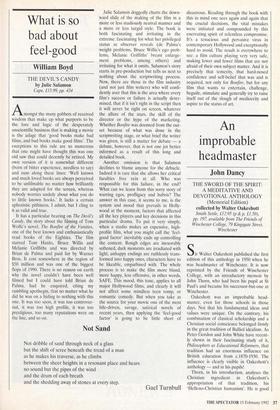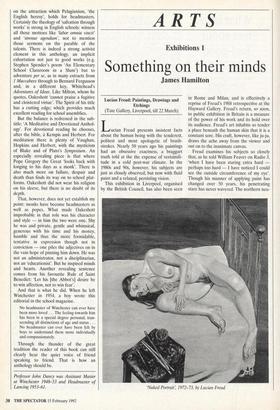An improbable headmaster
John Dancy
S it Walter Oakeshott published the first edition of this anthology in 1950 when he was headmaster of Winchester. It is now reprinted by the Friends of Winchester College, with an introductory memoir by John Thorn, who had been his pupil at St Paul's and became his successor-but-one at Winchester.
Oakeshott was an improbable head- master, even for those schools in those days. Not that his fundamental ideas and values were unique. On the contrary, his combination of classical scholarship and a Christian social conscience belonged firmly in the great tradition of Balliol idealism. As Peter Gordon and John White have recent- ly shown in their fascinating study of it, Philosophers as Educational Reformers, that tradition had an enormous influence on British education from c.1870-1930. The influence is clearly visible in Oakeshott's anthology — and in his pupils!
Thorn, in his introduction, analyses the Christian ingredient in Oakeshott's appropriation of that tradition, his `Helleno-Christian humanism'. He is good
on the attraction which Pelagianism, 'the English heresy', holds for headmasters. Certainly the theology of 'salvation through works' is strong in English schools: witness all those mottoes like 'labor omnia vincit' and `strenue agendum', not to mention
those sermons on the parable of the talents. There is indeed a strong activist element in this anthology, an implicit exhortation not just to good works (e.g. Stephen Spender's poem 'An Elementary School Classroom in a Slum') but to adventure per se, as in many extracts from 1 Maccabees through to Bernard Fergusson and, in a different key, Whitehead's Adventures of Ideas. Like Milton, whom he quotes, Oakeshott 'cannot praise a fugitive and cloistered virtue'. The Spirit of his title has a cutting edge; which provides much excellent reading for school assemblies.
But the balance is redressed in the sub- title: 'A Meditative and Devotional Anthol- ogy'. For devotional reading he chooses, after the bible, a Kempis and Herbert. For meditation there is plenty of Vaughan, Hopkins and Herbert, with• the mysticism of Blake and of Plato's Symposium. An especially revealing piece is that where Pope Gregory the Great 'looks back with longing to his days as a monk'. There is also much more on failure, despair and death than finds its way on to school plat- forms. Oakeshott did not wear his religion on his sleeve, but there is no doubt of its depth.
That, however, does not yet establish my point: monks have become headmasters as well as popes. What made Oakeshott improbable in that role was his character and style — in him the two were one. Shy he was and private, gentle and whimsical, generous with his time and his money, humble and thus the more formidable, tentative in expression though not in
conviction — one piles the adjectives on in the vain hope of pinning him down. He was
not an administrator, not a disciplinarian, not an 'educationist'. But he inspired minds and hearts. Another revealing sentence comes from his favourite Rule of Saint Benedict: 'Let his [the Abbot's] desire be to win affection, not to win fear', And that is what he did. When he left Winchester in 1954, a boy wrote this editorial in the school magazine.
No headmaster of Winchester can ever have been more loved ... The feeling towards him has been in a special degree personal, tran- scending all distinctions of age and status ... No headmaster can ever have been felt by boys to understand them more individually and compassionately.
Through the thunder of the great tradition the reader of this book can still clearly hear the quiet voice of friend speaking to friend. That is how an anthology should be.
Professor John Dancy was Assistant Master at Winchester 1948-53 and Headmaster of Lancing 1953-61.



























































 Previous page
Previous page